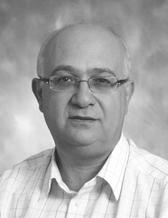
- Home
- News and events
- Find news
- Honorary doctor with a focus on educational effectiveness
Honorary doctor with a focus on educational effectiveness
“Promoting student learning should be the main mission of any educational system, school, and teacher”, says Leonidas Kyriakides, Professor of Educational Research and Evaluation at the University of Cyprus, who has been awarded an honorary doctorate by the Faculty of Education.

Leonidas Kyriakides has had a longstanding collaboration with the faculty, particularly within the research environment known as “Prerequisites, Education, Results” (FUR). Over the years, he has made significant contributions to the field of educational effectiveness research and evaluation.
What first sparked your interest in educational effectiveness?
"I strongly believe that promoting student learning should be the main mission of any educational system, school, and teacher. By conducting educational effectiveness studies and contributing to the development of the theoretical framework of educational effectiveness research, one may also contribute to the promotion of student learning outcomes.
More than 20 years ago, I decided to conduct studies in the field of educational effectiveness and my intention was not only to contribute to the theoretical development of the field of educational effectiveness by developing a model that considers the dynamic nature of education, but also to find ways to establish links between educational effectiveness research and teacher and school improvement."
The problems that we have to 'solve' in the field of educational effectiveness are much more complicated and, allow me to say, more interesting than the mathematical problems that I had to solve even when I was an undergraduate student in mathematics.
"Another reason for my interest in educational effectiveness has to do with the difficulty level of the research questions of this field. Since I was a young pupil in primary school, I used to love mathematics, because it gives you the chance to solve problems and to be creative. I still love solving mathematical problems, but I have realized that the problems that we have to “solve” in the field of educational effectiveness are much more complicated and, allow me to say, more interesting than the mathematical problems that I had to solve even when I was an undergraduate student in mathematics. Finding factors of effectiveness, explaining why these factors matter, specifying under which conditions and for whom these factors promote learning is a very complex and challenging task, due to the dynamic nature of education."
Can you share some key insights from your research?
"More than fifteen years ago, our research team developed a theoretical model of educational effectiveness. This dynamic model refers to factors operating at four levels: student, teacher, school, and educational system. It also considers that the teaching and learning situation is influenced by the wider educational context in which students, teachers, and schools are expected to operate."
I argued for the need of establishing an evidence-based and theory-driven approach for teacher and school improvement
"The development of the dynamic model did not aim to simply describe the complex nature of educational effectiveness, but it was expected to be used as a framework of an improvement approach that can have an effect on promoting quality in education. In this respect, I argued for the need of establishing an evidence-based and theory-driven approach for teacher and school improvement. To achieve this, we conducted several studies that provided empirical support for the dynamic model, especially at the classroom and school level.
Our next step was, therefore, to develop a specific approach to promoting quality in education which is not only in line with the main findings of educational effectiveness research but also takes into account the major lessons emerged from research on school improvement. In this respect, the dynamic approach to teacher and school improvement was developed.
During the last decade, evidence supporting the importance of the dynamic approach emerged from not only national but also several international experimental studies. More specifically, these studies have provided support to the main assumptions of the dynamic approach by first of all demonstrating the effect of the dynamic approach on promoting student learning outcomes through improving the functioning of teacher and school level factors. Second, these studies have examined the impact of the dynamic approach on promoting different types of learning outcomes – including the reduction of bullying – and in this way they have generated empirical support for the argument that the dynamic approach can be treated as generic in nature. Third, the added value of using the dynamic approach to teacher and school improvement for a period longer than a single school year was demonstrated."
What are you currently working on?
“I have recently published a book arguing for the importance of promoting not only quality but also equity in education. Three years ago, we published a book that can be seen as the end product of the first phase of a journey that started 20 years ago, aiming to gradually establish an evidence-based and theory-driven approach to promote quality in education. During the last five years we decided to move to the next step and search for ways of developing a theory that can help us promote not only quality but also equity.
I expect that further research on testing the dynamic model and on using the dynamic approach for promoting quality and equity in education may help researchers, policy makers and practitioners not only to have a better understanding of the complex and dynamic nature of effectiveness but also to make use of this knowledge base to improve student learning outcomes and make classrooms, schools and educational systems more fair places.”
What does the honorary doctorate appointment mean to you?
"First of all, I would like to express my deepest gratitude to my colleagues in the Faculty of Education of the University of Gothenburg for the honorary doctorate appointment. It is my honor and pleasure to get an honorary doctorate from the University of Gothenburg which is a leading university in the country with excellent researchers in several fields including education. By appointing me as honorary doctorate of the Faculty of Education, shows the appreciation and acknowledgement of my contributions to the field of effectiveness and also reveals the excellent collaborations that I had with several members of the faculty for more than 10 years now. This appointment also strengthens our bonds for continuous collaboration for the years to come, with the University of Gothenburg."
The promotion ceremony takes place on October 20, 2023.
Interview: Kristina Modigh
